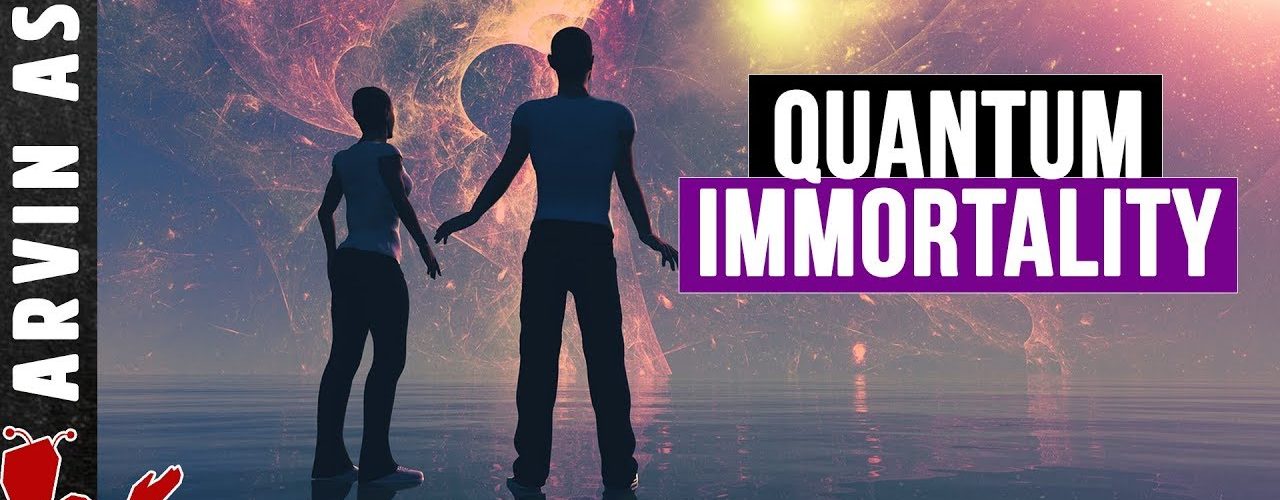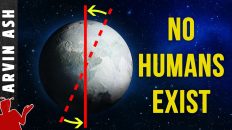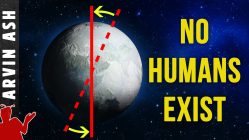What quantum Immortality means for you and your loved ones. Do you remember a time when you had a close call, a brush with death? You look back at it and think that an angel was somehow looking out for you.
And today you thank your lucky stars that you are still alive.
What if I told you that you actually died that day. That right now you are living in an alternate reality, where you take your life and the fact of being alive for granted.
But there is parallel reality in which you died and your loved ones are still grieving about you.
This is the profound implication of Quantum physics, based on something called the many worlds interpretation. And is backed by some of the biggest names in theoretical Physics.
Could this really be true? And if it is, then what does it mean for your life and your loved ones?
Quantum mechanics shows that all particles are really not particles at all but really waves of probabilities. There are two common interpretations of how these waves become the particles that we seem to observe.
The most conventional interpretation is called the Copenhagen interpretation, and it says that the probability wave collapses, and the particles become distinct at the moment they are measured. And these so-called measurements can occur whenever two or more particles interfere with each other’s probability wave.
A competing interpretation to this, which is gaining favor with many physicists including some of the biggest names in physics, is called the many worlds interpretation. It postulates that no collapse actually occurs…That everything in the entire universe is wave function. According to this, probability waves never collapse. That what we observe as a distinct reality , coccurs , that reality branches into parallel worlds where a wave collapse may seem to occur for us, but in fact does not collapse in another reality.
So this is why it is called the many worlds interpretation because as wave collapse occurs due to observations, a parallel universe is created where wave collapse does not occur.
This theory seems to introduce the complication of creating many worlds, so why is it so widely embraced by physicists? Occam’s razerbe a more complicated theory because it introduces a near infinite number of parallel universes. But proponents argue that this actually simplifies the seeming randomness of quantum physics. Since all possibilities are potentially real in parallel universes, there is no randomness. It only seems random to us because we experience reality in only one of the branches.
So according to this, all possible alternate histories and futures are equally real and exist in parallel.
This interpretation predicts many parallel worlds in which every time you had a brush with death, you acAnd it seems to imply that your consciousness may be immortal because it always survives in the reality in which you stay alive. But
‘
One interpretation of quantum mechanics is called the many worlds interpretation. This has gained enormous support among very prominent physicists.
One outcome of this theory shows
But if this theory is true, as many prominent physicists believe, then it has mind blowing implications for your death, and death of your loved ones.
It would mean that there is a version of reality where your dog or cat, or your mother, father, brother, sister, or grandparent, who may have died in your reality here is alive and well. Could quantum mechanics in some way be actually verifying the idea of an immortal consciousness, or dare I say immortal soul, which many people believe?
The answer is coming up right now.
What is soul after all? Isn’t it just a disembodied consciousness. What n mechanics seems to be telling us is that our consciousness may survive accidents, and sudden deaths. Unlike a soul, our consciousness is always attached to our bodies, but that there is a universe where this consciousness continues to live from your perspective. In fact, if you can recall being in a close call, where you almost got killed, then almost certainly, you did get killed in a parallel reality, but your consciousness survived in this reality where you did not get killed. In that other reality, they buried you, and your loved ones came to your funeral. But this is unbeknownst to you. As far as you know, you have always been in this reality where you survived. What I am suggesting is, that this is the parallel reality that you survived.
More recently, physicist Bryce DeWitt, who theorized how quantum mechanics might apply to gravity and the dynamics of the universe itself, argued that because there are presumably no observers outside the cosmos to view it (and trigger collapse into quantum gravity eigenstates), a complete accounting of quantum physics could not include observers.
Instead, DeWitt, until his death in 2004, was an ardent advocate of an alternative to the Copenhagen (standard) interpretation of quantum mechanics that he dubbed the Many Worlds Interpretation (MWI).
Schrödinger’s cat would be happily alive in one reality, to the joy of its owner, while cruelly deceased in the other, much to the horror of the same owner (but in a different branch). Each observer in each branch would have no conscious awareness of his near-doppelgangers.
Everett reportedly believed in this kind of “quantum immortality.” Fourteen years after his death in 1982, his daughter Liz took her own life, explaining in her suicide note that in some branch of the universe, she hoped to reunite with her father.
There are major issues with the prospects for quantum immortality however. For one thing the MWI is still a minority hypothesis. Even if it is true, how do we know that our stream of conscious thought would flow only to branches in which we survive? Are all possible modes of death escapable by an alternative array of quantum transitions? Remember that quantum events must obey conservation laws, so there could be situations in which there was no way out that follows natural rules. For example, if you fall out of a spaceship hatch into frigid space, there might be no permissible quantum events (according to energy conservation) that could lead you to stay warm enough to survive.
Another issue is that this type of branching only occurs where there is a binary option, in other words you die instantly or survive. If you consciousness slowly fades away as in cases of cancer or old age, then this interpretation likely would not apply.
In response to questions about “subjective immortality”, Max Tegmark made some brief comments: He acknowledged the argument that “everyone will be immortal” may follow if a survivor outcome is possible for all life-threatening events. The flaw in that argument, he suggests, is that dying is rarely a binary event; it is a progressive process. The quantum suicide thought experiment attempts to isolate all possible outcomes for the duration of the thought experiment. That isolation delays decoherence in such a way that the subjective experience of the superposition is illustrated. It is only within the confines of such an abstract quantum scenario that an observer finds they defy all odds
Tegmark also believes experimenters will only expect a normal probability of survival, not immortality. The experimenter’s probability amplitude in the wavefunction decreases significantly, meaning they exist with a much lower measure than they had before. Per the anthropic principle, a person is less likely to find themselves in a world where they are less likely to exist, that is, a world with a lower measure has a lower probability of being observed. Therefore, the experimenter will have a lower probability of observing a world in which they survive than the world in which they set up the experiment.[10] This same problem of reduced measure was pointed out by Lev Vaidman in the Stanford Encyclopedia of Philosophy.[1
Whenever I might die, there will be another universe in which I still live, some quantum event (even if astronomically unlikely) which saves me from death. Hence, it is claimed, I will never actually experience my own death, but from my own perspective will live forever, even as countless others will witness me die countless times. Life will, however, get very lonely, since everyone I know will eventually die from my perspective.
However, there are many problems if one wishes to take quantum immortality seriously. First and foremost, it is dependent on the many-worlds interpretation being correct. Despite what some people claim, though, it is far from established that many-worlds is actually right. One survey of attendees, mostly physicists, to a conference on “Quantum Physics and the Nature of Reality” had only 18% choose many-worlds as their preferred interpretation.[4]
it is unclear how quantum mechanical effects work exactly on the macroscopic scale. For example, can random quantum events really preserve your brain through trauma from a high-speed car accident, or lack of oxygen from drowning? Or even bubble up a copy of you out of thin air somewhere else in the world, sufficiently far away?
Even if the requisite type of multiverse is real, and even if survival is physically possible in some universe, you will not experience anything like quantum immortality. The idea assumes that consciousness cannot be interrupted, or end, from its own viewpoint. This must be false. Every night when you go to sleep, your consciousness ends (temporarily in this case). If your consciousness only flowed into universes where it was preserved, you would expect to experience ‘quantum insomnia,’ which of course does not happen. Thus, if you were to perform quantum suicide, your consciousness would terminate with increasing probability the more times the experiment was performed, not experience immortality.
Another major flaw in the idea is the fact that consciousness is not fundamental and indivisible. Rather, it emerges from the interplay of neurons in the brain, and can be weakened gradually due to parts of the brain being inactivated (as when sleeping) or removed. As a person dies, it takes billions of Planck times (the quantum, or smallest measurement, of time)[5] for their brain states to get more and more damaged, regardless of if it is slowly due to old age, or at light speed due to a vacuum decay. Now we have the problem of arbitrarily defining which of these successively more damaged states is the most damaged it can be and still be ‘you.’ In quantum suicide, why would your thread of identity follow only the brain states in the universe where the gun does not fire, and not the brain states in the universe where the bullet is slowly (from a quantum perspective) traveling through the air and then entering your brain, drastically altering its state? Since consciousness is emergent, there is no cutoff where the brain states suddenly cease to be ‘you,’ and the destruction of your brain causes your consciousness to flicker out.
This very problem was recognized by Max Tegmark, who first set out the thought experiment. He stated:
“However, I think there’s a flaw. After all, dying isn’t a binary thing where you’re either dead or alive – rather, there’s a whole continuum of states of progressively decreasing self-awareness….I suspect that when I get old, my brain cells will gradually give out (indeed, that’s already started happening…) so that I keep feeling self-aware, but less and less so, the final “death” being quite anti-climactic, sort of like when an amoeba croaks.”[1]
The final flaw in this idea, also pointed out by Tegmark,[6] is that any world where you survive quantum suicide has a much lower measure than the world you lived in beforehand. In other words, your probability amplitude in the wavefunction decreases significantly, meaning you exist to a much lower ‘degree’ than you had before. Per the anthropic principle, you are less likely to find yourself in a world where you are less likely to exist, that is, a world with a lower measure has a lower probability of being observed. Therefore, you will have a lower probability of observing a world in which you survive after the experiment than the world in which you initially set up the experiment.
Considering all these factors, this should not be thought of as a serious theory of immortality. Nor should you attempt to verify or falsify it.
that the probability wave of particles never collapses. And this idea of parallel universes comes from the Many worlds interpretation of quantum mechanics.
According to the laws of quantum mechanics all particles are in superposition, meaning they exist as waves of probabilities in multiple states, and multiple locations at once. The probability wave collapses and particles gain distinct properties and location only when they are measured.
The many worlds interpretation which was proposed by Hugh in 1957 says that the wave never collapses, that every time a wave seemingly collapses in our universe, there is a parallel universe where no such collapse happens.
This interpretations implies that reality splits like a fork in the road whenever a wave collapse occurs.
The many worlds interpretation avoids the complication of wave function collapse, but it creates the seeming new complication of a near infinite number of parallel worlds.
This seems to be a fantastical idea, that there’s a universe out there for every outcome that you can possibly conceive. Just like in quantum mechanics, everything with a non-zero probability of occurring is a reality in some universe.
In other words, there is a universe out there where everything happened just like it did in this one, except you made one or two decisions differently, and your life turned out completely different – like you became as rich as Bill Gates, or married Kate Upton.
Bryce DeWitt who popularized the many worlds interpretation in the 1970’s says, “Every quantum transition taking place on every star, in every galaxy, in every remote corner of the universe is splitting our local world on earth into myriads of copies.”
Very bold claims like this require some bold evidence, so we have to ask some questions, like ok…How does a split actually happen?
Or what circumstances cause the splitting.
Well, this is the crazy thing about this interpretation, it says that the splitting occurs whenever a wave collapses, meaning whenever a measurement of observation occurs.
When you walk around your own house, there must be millions of splitting events because the molecules on your feet are interacting with the molecules of the floor. The numbers of splits and parallel universes has to be astronomical.
Some physicists consider this almost self-evidently absurd.
But others like Oxford physicist David Deutsch says, many worlds is virtually a fact, it is no more an interpretation than dinosaurs are an interpretation of the fossil record.
It sounds fantastic, but the Many Worlds interpretation predicts outcomes that are completely consistent with physics experiments over the course of decades. So it has to be taken seriously even though it sounds ridiculous.
I have to say that Billions or trillions of worlds is not aesthetically pleasing to me. But I can’t reject a theory just because it does not satisfy my human intuitions. I have no vote on how the universe should work. I have to accept what the evidence points to.
But one of the most serious difficulties with multiple worlds is what it does to the notion of self.
MIT physicist Max Tegmark says, “The act of making a decision causes a person to split into multiple copies.”
But what does it mean to say that splittings generate copies of me? In what sense are those other copies “me?” I have no awareness of the other copies.
Columbia University Professor Brian Greene says we just need to broaden our minds of what “self” actually means. “Each copy believes that it is you. The real you is the sum total” of all the splittings
But Physicist and philosopher David Wallace, says that the notion of “I” can only make sense only if one’s consciousness is confined to a single branch of the quantum multiverse reality.
But there is no physics that would explain that. If your consciousness —or awareness of you — were somehow able to snake along just one path in the quantum multiverse as Wallace says, then we’d have to regard it as some nonphysical entity immune to the laws of physics.
So how could we ever know if the Many-Worlds theory is correct? In the late 1990s a thought experiment was proposed by MIT physicist Max Tegmark — called quantum suicide.
This is similar to the Schrodinger Cat experiment and an analogous experiment would go something like this.
Let’s say you are participating in a wager. You are put in a box with a gun pointed to your head and a button in your hand.
The button controls a quantum splitter that detects the spin of an electron. If after you press the button the spin says up, the gun does not fire, you come out of the box and win a prize of $1 Billion. But if the spin shows down, then the gun fires and you die instantly.
There is a 50% chance that the splitter would detect up, and 50% that it would detect down. The question is, would you take this bet. Few people, I think, would accept 50/50 odds of life and death.
But I might take this bet. And here’s why. If you truly believe in the concept of multiple worlds then you would take this bet every time. Because the only one of “you” that would ever come out of that box would be the one that remains conscious. In other words, in your world, for you to be conscious, you would always have to be in the reality that survived.
In another world, the other yous would be dead, but you would not know this. Your conscious self would always survive and become a billionaire.
The bottom line is this, in the many worlds interpretation, all outcomes with a non-zero probability have a 100% chance of occurring in a parallel universe.
If consciousness is restricted to one world, you will always survive the box wager because you’re the survival of your awareness depends on your not being dead.
Even if the requisite type of multiverse is real, and even if survival is physically possible in some universe, you will not experience anything like quantum immortality. The idea assumes that consciousness cannot be interrupted, or end, from its own viewpoint. This must be false. Every night when you go to sleep, your consciousness ends (temporarily in this case). If your consciousness only flowed into universes where it was preserved, you would expect to experience ‘quantum insomnia,’ which of course does not happen. Thus, if you were to perform quantum suicide, your consciousness would terminate with increasing probability the more times the experiment was performed, not experience immortality.
Another major flaw in the idea is the fact that consciousness is not fundamental and indivisible. Rather, it emerges from the interplay of neurons in the brain, and can be weakened gradually due to parts of the brain being inactivated (as when sleeping) or removed. As a person dies, it takes billions of Planck times (the quantum, or smallest measurement, of time)[5] for their brain states to get more and more damaged, regardless of if it is slowly due to old age, or at light speed due to a vacuum decay. Now we have the problem of arbitrarily defining which of these successively more damaged states is the most damaged it can be and still be ‘you.’ In quantum suicide, why would your thread of identity follow only the brain states in the universe where the gun does not fire, and not the brain states in the universe where the bullet is slowly (from a quantum perspective) traveling through the air and then entering your brain, drastically altering its state? Since consciousness is emergent, there is no cutoff where the brain states suddenly cease to be ‘you,’ and the destruction of your brain causes your consciousness to flicker out.
This very problem was recognized by Max Tegmark, who first set out the thought experiment. He stated:
“However, I think there’s a flaw. After all, dying isn’t a binary thing where you’re either dead or alive – rather, there’s a whole continuum of states of progressively decreasing self-awareness….I suspect that when I get old, my brain cells will gradually give out (indeed, that’s already started happening…) so that I keep feeling self-aware, but less and less so, the final “death” being quite anti-climactic, sort of like when an amoeba croaks.”[1]
The final flaw in this idea, also pointed out by Tegmark,[6] is that any world where you survive quantum suicide has a much lower measure than the world you lived in beforehand. In other words, your probability amplitude in the wavefunction decreases significantly, meaning you exist to a much lower ‘degree’ than you had before. Per the anthropic principle, you are less likely to find yourself in a world where you are less likely to exist, that is, a world with a lower measure has a lower probability of being observed. Therefore, you will have a lower probability of observing a world in which you survive after the experiment than the world in which you initially set up the experiment.
Considering all these factors, this should not be thought of as a serious theory of immortality. Nor should you attempt to verify or falsify it.
But a person cannot be aware of his death – or other selves — that exist in parallel universes.
But obviously we can not test the multiple worlds theory in this way, so How do we test for these parallel universes?
Max Tegmark says we can test this by studying quantum mechanics and building quantum computers. If a quantum computer fails, and we learn that fundamentally the equations of quantum mechanics are wrong, then these parallel universes don’t exist.
But if we can build quantum computers, and quantum mechanics equations are proven true, then we have to take it seriously no matter how aesthetically unpleasing it seems.
So, assuming QM laws apply universally, every possible outcome of an event is physically realized and the fact that you can only experience situations where you’re alive means that you’ll be funneled into those realities where you continue to live.
“We are Selenia. You will come with our escort to stand trial, and answer to questioning.. We are taking back the homebase” – Dad – John Nile
“Good Luck.” – Random enemy soldier – Dad
“Ha!” – Michelle Jason. – Evan
“Um Ma’am…” – Selenien soldier 1 – Dad
“What is it?”– Michelle Jason – Evan
Look.” – selenien soldier 1 – Dad
“God Save Us.” – Michelle Jason – Evan







